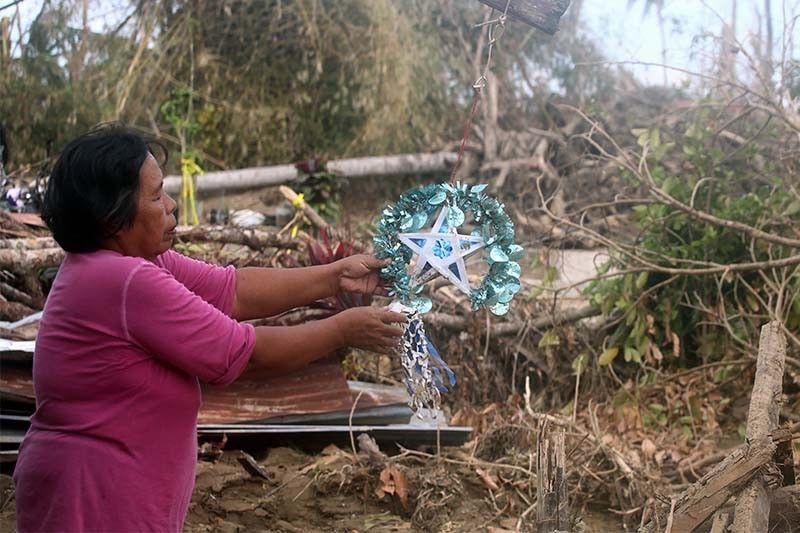Addressing climate change with disaster, holiday altruism

When Super Typhoon Odette came, devastation reigned. The unprecedented damage across Visayas and Mindanao left many without access to basic necessities such as food, electricity, telecommunications and reliable information. When it left, Odette took with it a reported 367 lives and rendered thousands homeless, with over 52,000 homes damaged beyond repair.
With critical infrastructure such as roads, bridges, electricity and telecommunications down, responders and concerned family members and friends had little access to those caught in the path of the deadly typhoon.
According to Orlando Oxales of the advocacy group CitizenWatch Philippines, “The disruption in telecommunications was felt in the immediate aftermath of the disaster, with relatives unable to contact their loved ones to find out whether they survived the typhoon. This created a terrifying vacuum of information in the crucial hours when relief was most needed.”
Citing the importance of power and telecommunications infrastructure to post-disaster recovery, Oxales said, “We need fast action and cooperation between telcos and power cooperatives. The disruption in electricity and communication services hampers efforts to save lives and property and compromises these communities’ ability to bounce back quickly after the disaster.”
To hasten the rehabilitation of the critical infrastructure affected by Odette, Oxales suggested that electricity cooperatives be allocated with the quick- disbursing loans extended by the World Bank for a post-disaster response.
He also called on the government to work closely with the private sector to modernize our power and digital infrastructure, especially in these regions where electricity cooperatives need significant capital to upgrade capacity and build readiness to react to these events.
In addition to private sector-led initiatives to restore power and connectivity, local government clearing operations are just as critical. This is because the movement of first responders and much-needed supplies all ground to a halt if roads and bridges are not passable. For this, both the Department of Public Works and Highways and LGUs play an essential role.
The advocacy group pointed out further that the state of our critical infrastructure and the general situation on the ground reflects the gaps in the country’s disaster resilience and shows how vulnerable we are to external factors like extreme weather.
Indeed, in addition to highlighting needed improvements in our post-disaster response, Typhoon Odette also showed us just how highly vulnerable we are to the long-term impacts of extreme weather events and climate change.
In fact, according to the Global Climate Risk Index (CRI) 2021, the Philippines, which came in at 17th out of 180 countries, is one of the most exposed and vulnerable in the world to extreme weather events.
According to the report, signs of escalating climate change can no longer be ignored. The impacts from extreme weather events hit the poorest countries hardest. These are particularly vulnerable to the damaging effects of a hazard, have a lower coping capacity, and may need more time to rebuild and recover.
The aftermath of typhoon Odette also serves as the unfortunate yet important context for many of the scenarios and suggestions shared by climate change advocates and experts during one of the recent discussions organized by our institute on green and sustainable recovery.
According to Mahar Lagmay of the University of the Philippines - Nationwide Operational Assessment of Hazards (UP-NOAH) Center, there are two ways to approach the problem of climate change – climate change mitigation and climate change adaptation.
“Climate change mitigation simply means that we have to reduce greenhouse gases that we inject into the atmosphere and that means that we must be able to control the burning of fossil fuels. While climate change adaptation refers to how we plan our communities, alter our behavior, and change the system in which we live. To be able to adapt, we must be able to change our way of life,” Lagmay said.
Red Constantino of the Institute for Climate & Sustainable Cities argued further that “We cannot afford to tackle climate change with a narrow approach. Any emissions reduction strategy must be part of a larger transition strategy focused on achieving sustainable, inclusive and resilient economic development.”
“The way that our policymakers and businesses continue to understand climate change is a fixation on disasters. This is wrong because even extreme weather events, not just disasters, they will represent a small subset of a bigger challenge with climate change. We need to pay attention to slow onset events, which take place without the drama of calamity, without body counts, without the visual effects that media actually provides,” he added.
In the words of Stratbase ADR Institute’s President Prof. Dindo Manhit, climate change mitigation and adoption are a “shared responsibility that needs guidance and direction from public policies, civil society advocacy frameworks, and private sector support and investment.”
“Climate change cannot be addressed on a stand-alone basis,” he added.
The experts and advocates I’ve mentioned here raised good arguments and relevant points. Truly, our focus now must be on responding to the devastation left in Odette’s wake. On fully restoring critical infrastructure such as roads, power and telecommunications to ensure an effective post-disaster response.
At the same time, we must also grieve as a nation with those who have lost their loved ones and commiserate with the thousands that now find themselves homeless instead of celebrating the holidays safe at home with family. However, we cannot stop there.
Instead, we must hold on to the altruistic spirit that both the disaster and this holiday season bring out in us. And we must bear in mind that we have a continued responsibility to each other to transition to more sustainable and inclusive practices and help our communities mitigate and adapt to climate change.
Paco Pangalangan is the executive director of think tank Stratbase ADR Institute.
- Latest


























